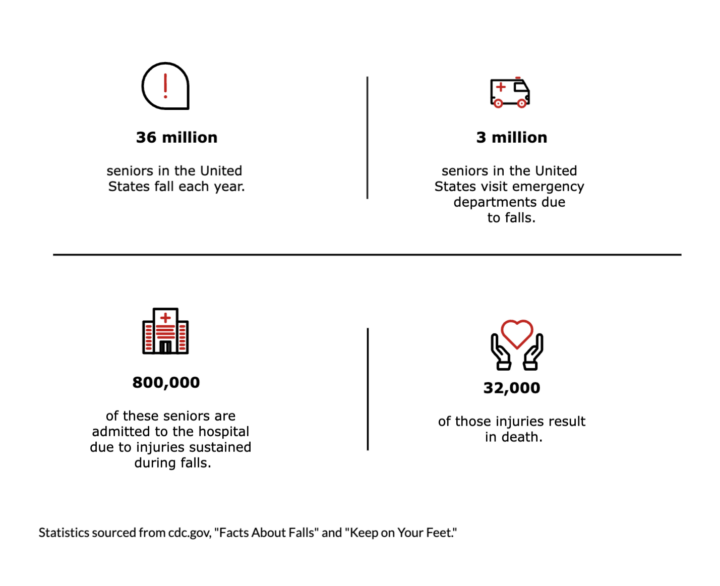Stay on Your Feet: 12 Fall Prevention Steps for Seniors

Krissy Huntley, PA
Do you know an older person who has taken a fall? Chances are you do, since one in four seniors (adults over 65) injure themselves annually. While some falls may not cause an injury, one in five falls is linked to broken bones or a head injury.
Once a person falls, the chance of them falling again doubles. People who fall once may become afraid and decrease their daily activities to avoid another fall. This decrease in activity can cause weakness and, in turn, increase falling risk. The good news is most falls are preventable with a good fall prevention plan.
What causes a fall in seniors? There are several risk factors to be aware of:
- Home hazards that can cause a slip, trip, or fall such as throw rugs, clutter, uneven steps, slipping while bathing or showering, or climbing on a step stool or chair to reach something
- Having lower body weakness or difficulties with walking and balance
- Attempting to carry items while going up or down steps or while walking on uneven flooring
- Taking medications that cause dizziness or sleepiness such as anti-depressants, tranquilizers, or sedatives and certain over-the-counter meds such as ibuprofen and sleep aids
- Impaired vision or hearing
- Foot/leg pain or poor footwear
- Vitamin D deficiency
The more risk factors you have, the higher your risk of falling. Once you turn 60, it’s important to start assessing your fall risk and reviewing your risk each year. There are several important steps to consider to help prevent falls:
- Equip your home with adequate lighting – add more lights and/or brighter bulbs if needed. Place night-lights in bedrooms and bathrooms.
- Repair any broken or uneven steps as well as uneven flooring and remove throw rugs and clutter on the floor. Make sure all pathways are clear.
- Install hand rails on both sides of any steps and add grab rails by the toilet and inside and outside the shower/tub area.
- Place things you use often in lower cabinets to avoid using a step stool.
- Being in a hurry is a major risk factor for falls! Take a deep breath and slow down if you feel rushed or anxious.
- When going from sitting to standing, take a few breaths, focus on balance, and plot your course before starting to walk. Use any walking equipment carefully. Be aware of your feet and surroundings as you walk. Stay mindful when moving.
- Make sure to schedule an annual vision exam. Your vision can change as you age, and not seeing clearly increases fall risk.
- If you or others notice a change in your hearing, schedule a hearing exam, as loss of hearing can also affect balance.
- Let your family, friends, and health care provider know if you’re having trouble with balance, walking, or dizziness. Ask for help if you need it!
It’s also important to discuss fall prevention topics with your health care provider:
- Review all medications with your provider, including over-the-counter medications and supplements. Taking more than four medications can increase fall risk, so an annual assessment of all medications is helpful. Report any symptoms such as dizziness, sleepiness, or loss of balance with any new medications.
- Ask your provider about exercise safety. If cleared for exercise, look into programs that promote lower body strength and balance such as strength training and Tai chi. If you are referred to physical therapy, keep doing home exercises after you are discharged to maintain strength and balance or join a program to help you stay strong.
- Discuss fall prevention topics with your health care provider.
Less than half of seniors tell their provider about a fall. It’s important to contact your provider if you have a fall, even if you’re not hurt, to make sure you’re medically assessed properly. Check in with your provider after a visit to the emergency department or hospital.
If you or a loved one experience a fall outside of HopeHealth’s normal operating hours, Access Hope is a convenient after-hours program for patients as an alternative to an expensive emergency department visit. Access Hope providers are available in Florence and Manning Monday-Saturday from 8 am-8 pm.
Your provider is there to help you stay healthy and independent as long as possible. Create a fall prevention plan, talk to your provider about your plan, and stay on your feet!
Krissy Huntley is a physician assistant at Access Hope at the HopeHealth Medical Plaza in Florence, SC. Access Hope is an after-hours program for HopeHealth patients. With services in Florence and Manning, Access Hope can assist patients with minor sprains, acute illness such as respiratory or urinary infections, immunizations, blood sugar, or other in-office testing. If you’re not a patient and interested in these services visit hope-health.org or call (843) 667-9414.
